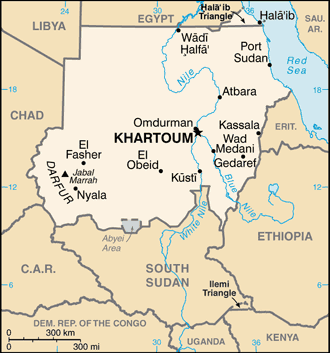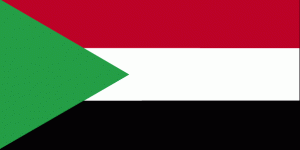Sudan
 Aglow Status: Restricted
Aglow Status: Restricted
(The term “Restricted Nation” as used in Aglow is a nation where it is difficult or dangerous to be a Christian. Therefore the status of Aglow in nations indicated as Restricted is withheld.)
Capital: Khartoum
Pray:
- Pray for all the resources and creativity needed to fulfill the intentions of God in the nation of Sudan.
- Pray for godly government leaders. Blessed is the nation whose God is The Lord, the people whom He has chosen for His own inheritance. Psalm 33:12
Proclaim:
- Arise, shine; for your light has come! And the glory of the LORD is risen upon you. For behold, the darkness shall cover the earth, and deep darkness the people; but the LORD will arise over you, and His glory will be seen upon you. Isaiah 60:1,2 (NKJV)
- Lift up your heads, O you gates! Lift up, you everlasting doors! And the King of glory shall come in. Who is this King of glory? The Lord of hosts, He is the King of glory. Selah Psalm 24:9-10 (NKJV)
Interesting Facts About Sudan
 Background: The region along the Nile River south of Egypt has long been referred to as Nubia. It was the site of the Kingdom of Kerma, which flourished for about a millennium (ca. 2500-1500 B.C.) until absorbed into the New Kingdom of Egypt. By the 11th century B.C., a Kingdom of Kush emerged and regained the region’s independence from Egypt; it lasted in various forms until the middle of the fourth century A.D. After the fall of Kush, the Nubians formed three Christian kingdoms of Nobatia, Makuria, and Alodia, the latter two endured until around 1500. Between the 14th and 15th centuries much of Sudan was settled by Arab nomads, and between the 16th–19th centuries it underwent extensive Islamization. Egyptian occupation early in the 19th century was overthrown by a native Mahdist Sudan state (1885-99) that was crushed by the British who then set up an Anglo-Egyptian Sudan – nominally a condominium, but in effect a British colony.
Background: The region along the Nile River south of Egypt has long been referred to as Nubia. It was the site of the Kingdom of Kerma, which flourished for about a millennium (ca. 2500-1500 B.C.) until absorbed into the New Kingdom of Egypt. By the 11th century B.C., a Kingdom of Kush emerged and regained the region’s independence from Egypt; it lasted in various forms until the middle of the fourth century A.D. After the fall of Kush, the Nubians formed three Christian kingdoms of Nobatia, Makuria, and Alodia, the latter two endured until around 1500. Between the 14th and 15th centuries much of Sudan was settled by Arab nomads, and between the 16th–19th centuries it underwent extensive Islamization. Egyptian occupation early in the 19th century was overthrown by a native Mahdist Sudan state (1885-99) that was crushed by the British who then set up an Anglo-Egyptian Sudan – nominally a condominium, but in effect a British colony.
Following independence from Anglo-Egyptian co-rule in 1956, military regimes favoring Islamic-oriented governments have dominated national politics. Sudan was embroiled in two prolonged civil wars during most of the remainder of the 20th century. These conflicts were rooted in northern economic, political, and social domination of largely non-Muslim, non-Arab southern Sudanese. The first civil war ended in 1972 but another broke out in 1983. Peace talks gained momentum in 2002-04 with the signing of several accords. The final North/South Comprehensive Peace Agreement (CPA), signed in January 2005, granted the southern rebels autonomy for six years followed by a referendum on independence for Southern Sudan. The referendum was held in January 2011 and indicated overwhelming support for independence. South Sudan became independent on 9 July 2011. Sudan and South Sudan have yet to fully implement security and economic agreements signed in September 2012 relating to the normalization of relations between the two countries. The final disposition of the contested Abyei region has also to be decided. The 30-year reign of President Umar Hassan Ahmad al-BASHIR ended in his ouster in April 2019, and a Sovereignty Council, a joint civilian-military-executive body, holds power as of November 2019.
Following South Sudan’s independence, conflict broke out between the government and the Sudan People’s Liberation Movement-North in Southern Kordofan and Blue Nile states (together known as the Two Areas), resulting in a humanitarian crisis affecting more than a million people. A earlier conflict that broke out in the western region of Darfur in 2003, displaced nearly 2 million people and caused thousands of deaths. While some repatriation has taken place, about 1.83 million IDPs remain in Sudan as of May 2019. Fighting in both the Two Areas and Darfur between government forces and opposition has largely subsided, however the civilian populations are affected by low-level violence including inter-tribal conflict and banditry, largely a result of weak rule of law. The UN and the African Union have jointly commanded a Darfur peacekeeping operation (UNAMID) since 2007, but are slowly drawing down as the situation in Darfur becomes more stable. Sudan also has faced refugee influxes from neighboring countries, primarily Ethiopia, Eritrea, Chad, Central African Republic, and South Sudan. Armed conflict, poor transport infrastructure, and denial of access by both the government and armed opposition have impeded the provision of humanitarian assistance to affected populations. However, Sudan’s new transitional government has stated its priority to allow greater humanitarian access, as the food security and humanitarian situation in Sudan worsens and as it appeals to the West for greater engagement.
On 6 January 2021, Sudan signed the US-sponsored Abraham Accords, normalizing ties with Israel and becoming the fourth Arab country to do so after Bahrain, the United Arab Emirates, and Morocco in 2020.
Government Type: presidential republic
Federal republic ruled by the National Congress Party the (NCP), which came to power by military coup in 1989; the CPA-mandated Government of National Unity, which since 2005 provided a percentage of leadership posts to the south Sudan-based Sudan People’s Liberation Movement (SPLM), was disbanded following the secession of South Sudan.
Population: 46,751,152 (July 2021 est.)
Ethnic Groups: unspecified Sudanese Arab (approximately 70%), Fur, Beja, Nuba, Fallata
Languages: Arabic (official), English (official), Nubian, Ta Bedawie, Fur
Religions: Sunni Muslim, small Christian minority
Interesting Facts information from the cia.gov website. Read more about Sudan
